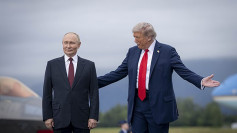President-elect Donald Trump has issued a stark warning to the BRICS nations-Brazil, Russia, India, China, and South Africa-threatening 100% tariffs if they pursue efforts to create a new currency or undermine the U.S. dollar. The warning extends to newer members of the bloc, including Egypt, Ethiopia, Iran, Saudi Arabia, and the United Arab Emirates, as well as other nations expressing interest in joining the alliance.
"We require a commitment from these Countries that they will neither create a new BRICS Currency, nor back any other Currency to replace the mighty U.S. Dollar," Trump posted on Truth Social on Saturday. "They will face 100% Tariffs and should expect to say goodbye to selling into the wonderful U.S. Economy."
The BRICS bloc, which collectively accounts for a growing share of global GDP, has been exploring ways to trade outside the U.S. dollar system. Brazilian President Luiz Inácio Lula da Silva proposed a common currency in South America earlier this year, while Russia and China have supported payment systems that bypass the dollar. Such moves have drawn ire from Trump, who has promised to protect the dollar's dominance in global trade.
At a BRICS summit in October, Russian President Vladimir Putin accused the U.S. of "weaponizing" the dollar. "It's not us who refuse to use the dollar," Putin said. "But if they don't let us work, what can we do? We are forced to search for alternatives." Moscow has pushed for alternative financial systems, such as bypassing SWIFT, to evade Western sanctions.
Trump dismissed the likelihood of the U.S. dollar being dethroned, calling it "secure in the near and medium term," citing an Atlantic Council model that affirms its role as the world's primary reserve currency.
Trump expressed confidence that the BRICS bloc would not succeed in replacing the U.S. dollar in global trade, warning that any nation attempting to do so should prepare to "wave goodbye to America."
The U.S. dollar remains dominant, accounting for roughly 58% of global foreign exchange reserves, according to the International Monetary Fund. Despite past challenges to its preeminence, commodities like oil are still primarily traded in dollars, and no viable alternative has emerged.
Trump's rhetoric comes amid broader trade policy announcements. He recently pledged sweeping tariffs on goods from Mexico, Canada, and China, citing concerns over illegal immigration, drug trafficking, and crime. The proposed tariffs include a 25% levy on all imports from Mexico and Canada and an additional 10% tax on Chinese goods.
In response to the tariff threats, Mexican President Claudia Sheinbaum expressed optimism about averting a trade conflict, following a call with Trump. Canadian Prime Minister Justin Trudeau, who met with Trump at Mar-a-Lago on Friday, described the dinner as "an excellent conversation." However, Trudeau left without assurances that Canada would be exempt from the proposed tariffs.
The potential for trade disputes with BRICS nations adds another layer of complexity to Trump's economic agenda. China, a central player in BRICS, has sought to leverage the bloc's expansion to challenge U.S. global leadership. For Russia, the alliance offers an opportunity to counter Western sanctions and isolation following its 2022 invasion of Ukraine.






